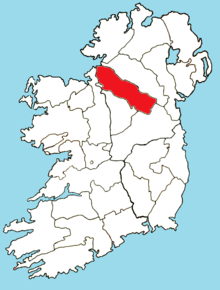Roman Catholic Diocese of Kilmore
| Diocese of Kilmore Dioecesis Kilmorensis Deoise na Cille Móire | |
|---|---|
|
The Cathedral of St. Patrick and St. Felim in Cavan, the episcopal seat of the bishops of Kilmore. | |
| Location | |
| Country |
|
| Territory | Most of County Cavan, parts of counties Leitrim, Fermanagh, Meath and Sligo |
| Ecclesiastical province | Province of Armagh |
| Metropolitan | Roman Catholic Archbishop of Armagh |
| Statistics | |
| Area | 850 sq mi (2,200 km2) |
| Population - Total - Catholics |
(as of 2013) 77,052 69,460 (90.1%) |
| Information | |
| Denomination | Roman Catholic |
| Rite | Latin Rite |
| Established | 1152 |
| Cathedral | St Patrick and St Felim's Cathedral, Cavan |
| Patron saint | St Patrick and St Felim |
| Current leadership | |
| Pope | Francis |
| Bishop | Philip Leo O'Reilly |
| Metropolitan Archbishop | Eamon Martin |
| Map | |
 | |
| Website | |
| kilmorediocese.ie | |
The Roman Catholic Diocese of Kilmore (Irish: Deoise na Cille Móire; Latin: Dioecesis Kilmorensis) is a Roman Catholic diocese which is mainly in the Republic of Ireland although a few parishes are in Northern Ireland. It is one of eight suffragan dioceses which are subject to the Metropolitan Archdiocese of Armagh.[1][2] The present Bishop is the Most Reverend Philip Leo O'Reilly, Bishop of Kilmore, who was installed on 15 November 1998.[3]
Geography
Kilmore diocese covers most of County Cavan and parts of counties Leitrim, Fermanagh, Meath and Sligo. The main towns are Bailieborough, Ballyjamesduff, Cavan, Manorhamilton and Virginia.
Ecclesiastical history
The diocese of Kilmore was originally called Breifne (Latin: Tirbrunensis, Tybruinensis or Triburnia; Irish: Tír mBriúin, meaning "the land of the descendants of Brian", one of the Uí Briúin kings of Connacht).[4][5] It was formally established as one of the dioceses approved by Cardinal Giovanni Paparoni at the synod of Kells in 1152. The boundaries of the diocese are approximately the same as those of the ancient Kingdom of Breifne;[5] which today consists of almost all of County Cavan, roughly the northern half of County Leitrim, and parts of County Fermanagh, County Meath and County Sligo.
In 1454, Bishop Aindrias Mac Brádaigh (Andrew McBrady) was given permission by Pope Nicholas V to have the ancient church at Kilmore, founded in the sixth century by Saint Felim, to be the cathedral church of the diocese. It was rebuilt and became to be known in Irish as An Chill Mhór (meaning Great Church) and anglicised as Kilmore, which gave its name to the diocese, a name which has remained ever since.
Tir Brun / Kilmore was a territorial diocese, based on the kingdom of Breifne. From the late twelfth century the chieftainship of Breifne was contested between the Ui Raghallaigh or O'Reilly sept in the east and the Ui Ruairc or O'Rourke sept in the west. The bishops of the diocese came predominantly from the eastern end of the diocese, right down until the reformation.
Kingdom of Ireland
During the Reformation in Ireland, the diocese lost the cathedral and all other temporalities. After a period of two hundred years of uncertainty, Bishop Denis Maguire (1770–98) gave new stability to the diocese and started the process of rebuilding both discipline and churches. Bishop James Browne (1827–65) continued with this work and founded the diocesan college in 1839. Bishop Patrick Lyons (1937–49) had the old Roman Catholic Cathedral in Cavan rebuilt between 1938 and 1942. The current cathedral is dedicated to Saints Patrick and Felim and is built in the neoclassical style with a spire of 230 ft (70.1 m).[5][6]
Ordinaries
The following is a basic list of the bishops of Kilmore since 1728.[7]
- Michael MacDonagh, O.P. (1728–1746)
- Laurence Richardson, O.P. (1747–1753)
- Andrew Campbell (1753–1769)
- Denis Maguire, O.F.M. (1770–1798)
- Charles O'Reilly (1798–1800)
- James Dillon (1800–1806)
- Farrell O'Reilly (1807–1829)
- James Browne (1829–1865)
- Nicholas Conaty (1865–1886)
- Bernard Finegan (1886–1887)
- Edward MacGennis (1888–1906)
- Andrew Boylan, C.SS.R. (1907–1910)
- Patrick Finegan (1910–1937)
- Patrick Lyons (1937–1949)
- Austin Quinn (1950–1972)
- Francis Joseph MacKiernan (1972–1998)
- Philip Leo O'Reilly (since–1998)
See also
- St Fethlimidh's Cathedral, Kilmore in the Diocese of Kilmore, Elphin and Ardagh (Church of Ireland)
References
- ↑ Archdiocese of Armagh. Retrieved on 16 January 2009.
- ↑ Diocese of Kilmore: Homepage. Retrieved on 16 January 2009.
- ↑ Diocese of Kilmore: The Bishop. Retrieved on 16 January 2009.
- ↑ Fryde et al. 1986, Handbook of British Chronology, p. 362.
- 1 2 3 "Diocese: Statistics and Brief History". Diocese of Kilmore. Retrieved 3 January 2012.
- ↑ Cathedral of Saints Patrick and Felim, Cavan. Retrieved on 16 January 2009.
- ↑ Diocese of Kilmore. Catholic-Hierarchy website. Retrieved 26 April 2010.
Coordinates: 53°59′41″N 7°21′41″W / 53.9948°N 7.3614°W
